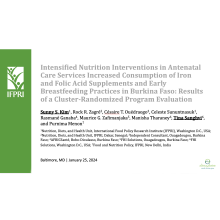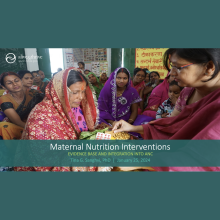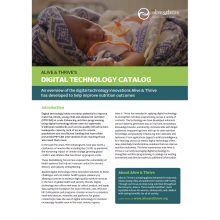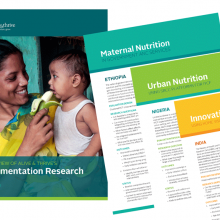Presentation
Mar 07 2024

Intensified Nutrition Interventions in Antenatal Care Services Increased Consumption of Iron and Folic Acid Supplements and Early Breastfeeding Practices in Burkina Faso: Results of a Cluster-Randomized Program Evaluation
This slide deck was part of a presentation given by the International Food Policy Research Institute and Alive & Thrive during a post-graduate course lecture at Johns Hopkins University on January 25, 2024.
Presentation
Mar 04 2024

Maternal Nutrition Interventions: Evidence Base and Integration Into ANC
Toolkit
Feb 01 2024

Alive & Thrive Digital Technology Catalog: An overview of the digital technology innovations Alive & Thrive has developed to help improve nutrition outcomes
Brief, Handout
Oct 28 2020

An overview of Alive & Thrive's implementation research
Alive & Thrive's implementation research spans its program areas, seeking to answer "how" to implement effective interventions and policies. Active studies are detailed in the attached documents.
Journal article
Jul 16 2020

Early child growth: how do nutrition and infection interact? (Dewey, K., 2011. Maternal & Child Nutrition)
This study reviews how the interaction between nutrition and infection affects child growth in low‐income populations.
Journal article
Jul 16 2020

The challenge of meeting nutrient needs of infants and young children during the period of complementary feeding: an evolutionary perspective (Dewey, K., 2013. The Journal of Nutrition)
This paper provides an evolutionary perspective on why modern complementary food diets are often inadequate, asserting that inadequate diets and nutritional deficiencies have likely been a part of the human condition since the agricultural revolution.

